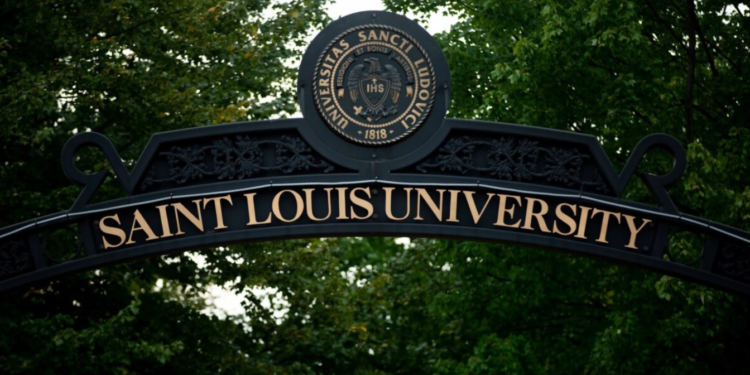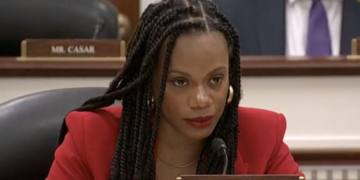April 16, 2025 Story by: Editor
What was intended to be a moment of reckoning and reconciliation at Saint Louis University was abruptly paused after a group representing descendants of people enslaved by the institution withdrew from the planned ceremony.
The group cited concerns that the university’s reconciliation efforts had become largely symbolic and failed to include meaningful reparations.
“We had no choice but to not participate in this today,” said Robin Proudie, executive director and founder of Descendants of the St. Louis University Enslaved (DSLUE), during a Wednesday press briefing.
Proudie, whose emotional delivery reflected years of engagement with the university, expressed deep disappointment in how the process unfolded.
“For five years we have done everything they have asked us to do,” she said, “but what we will not do is become a photo opp so they can parade us around and act like we are in alignment with what they are doing.”
Proudie descends from Henrietta Mills, who was enslaved by Jesuits in St. Louis roughly 165 years ago. Initially optimistic about the collaboration with the university, she told PBS News that the descendants decided to withdraw when they discovered the university’s board had approved a path forward that excluded reparations. Instead, the institution planned to issue an apology, erect a monument, and publish a report.
“If this is about mutual respect, then we want to be treated as such,” she added.
Saint Louis University spokesperson Clayton Berry confirmed to PBS News that a prayer service originally scheduled as part of the formal apology was postponed following the descendants’ decision not to participate.
A statement from university President Fred P. Pastello was posted on the door of St. Francis Xavier College Church, where the event was to take place. It acknowledged the delay: “In a number of forthright and challenging conversations this week, it became clear that we need to continue the work of building relationships with descendants before we are ready to proceed with a formal event.”
The university did not comment further on whether reparations would remain a part of future discussions.
Saint Louis University is among several higher education institutions facing increased pressure from advocacy groups and community leaders to address historical ties to slavery. The school’s history gained wider attention in 2016 after The New York Times reported on Georgetown University’s 1838 sale of 272 enslaved individuals to raise funds. Some of those sold were relocated to St. Louis, and their descendants continue to seek accountability and justice.
The Society of Jesuits, which established Saint Louis University, depended on enslaved labor globally beginning in 1540. In the United States, this practice continued until the abolition of slavery in 1865. The Jesuits utilized enslaved people to sustain their religious missions and educational institutions in states such as Missouri, Maryland, Pennsylvania, Kentucky, Louisiana, Alabama, Illinois, and Kansas. Saint Louis University, along with Georgetown University and Spring Hill College, directly benefited from this labor.
Over the years, Proudie has worked to uncover her ancestry through family documents, deepening her connection to the story and her advocacy.
Kelly Schmidt, a postdoctoral research associate at Washington University, determined in 2021 that at least 70 individuals were enslaved by the Jesuits in St. Louis.
The call for Saint Louis University to acknowledge and address its past was also echoed by students. In 2024, the student government passed a resolution urging the administration to create a formal action plan. In addition, St. Louis County NAACP President Adolphus M. Pruitt II penned a letter to DSLUE supporting the call for the university and the Society of Jesuits to “further acknowledge the harm that was inflicted upon these individuals and their descendants as a foundation for reconciliation and healing.”
Outside the church where the apology was originally scheduled to occur, Areva Martin, lead counsel for DSLUE, issued a direct appeal to the university.
“This is your opportunity to step up,” she said.
Source: PBS

















